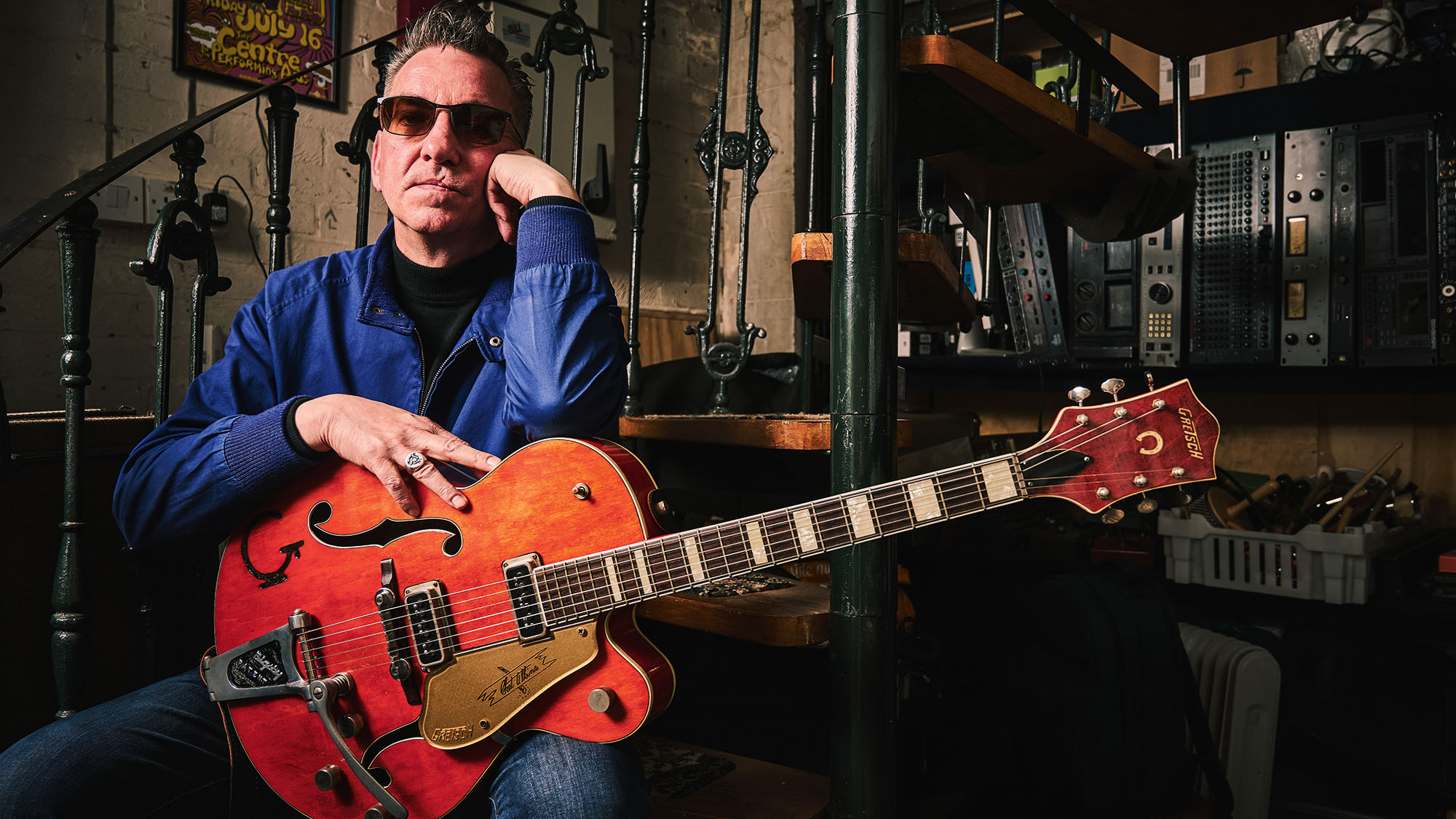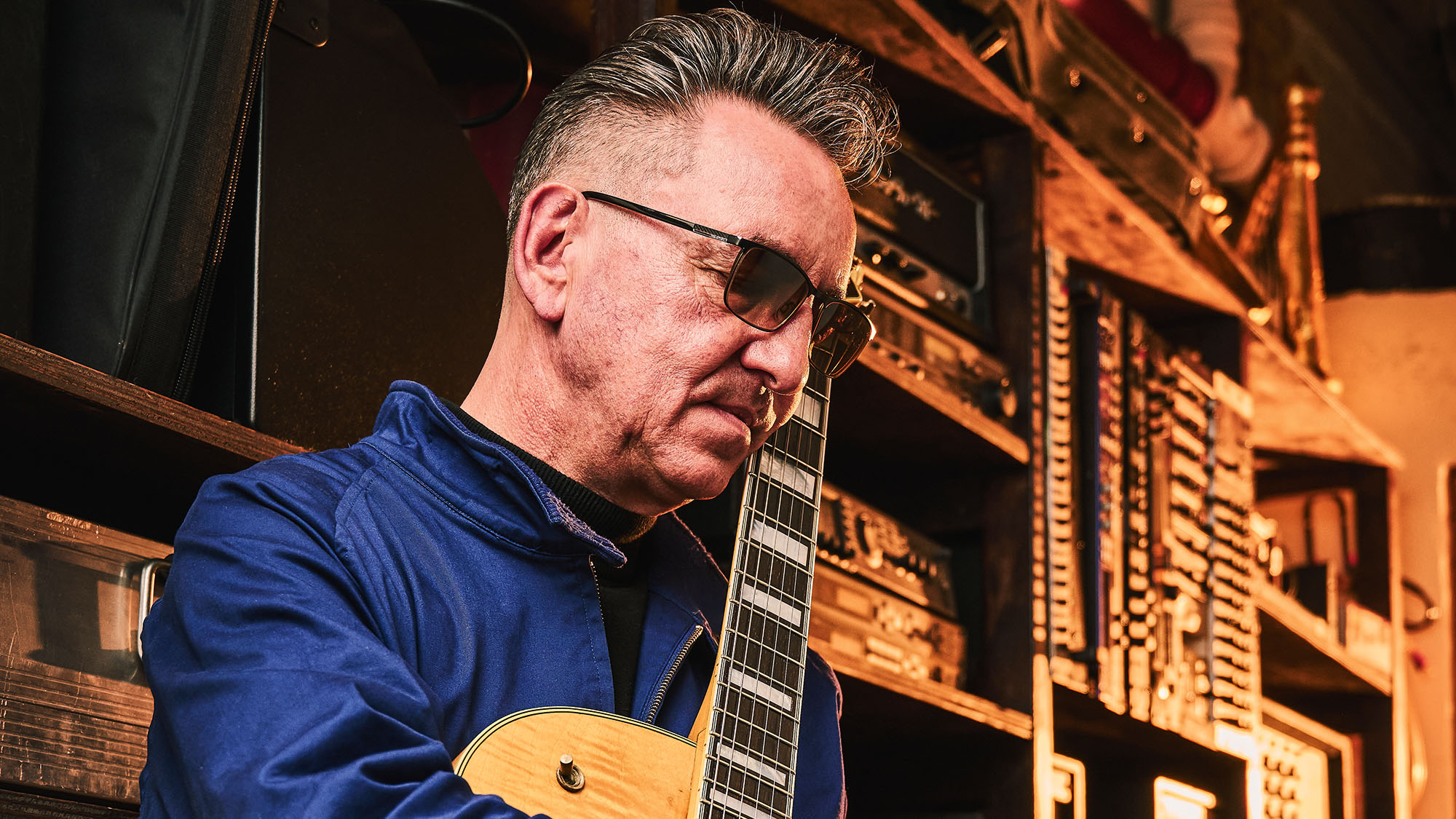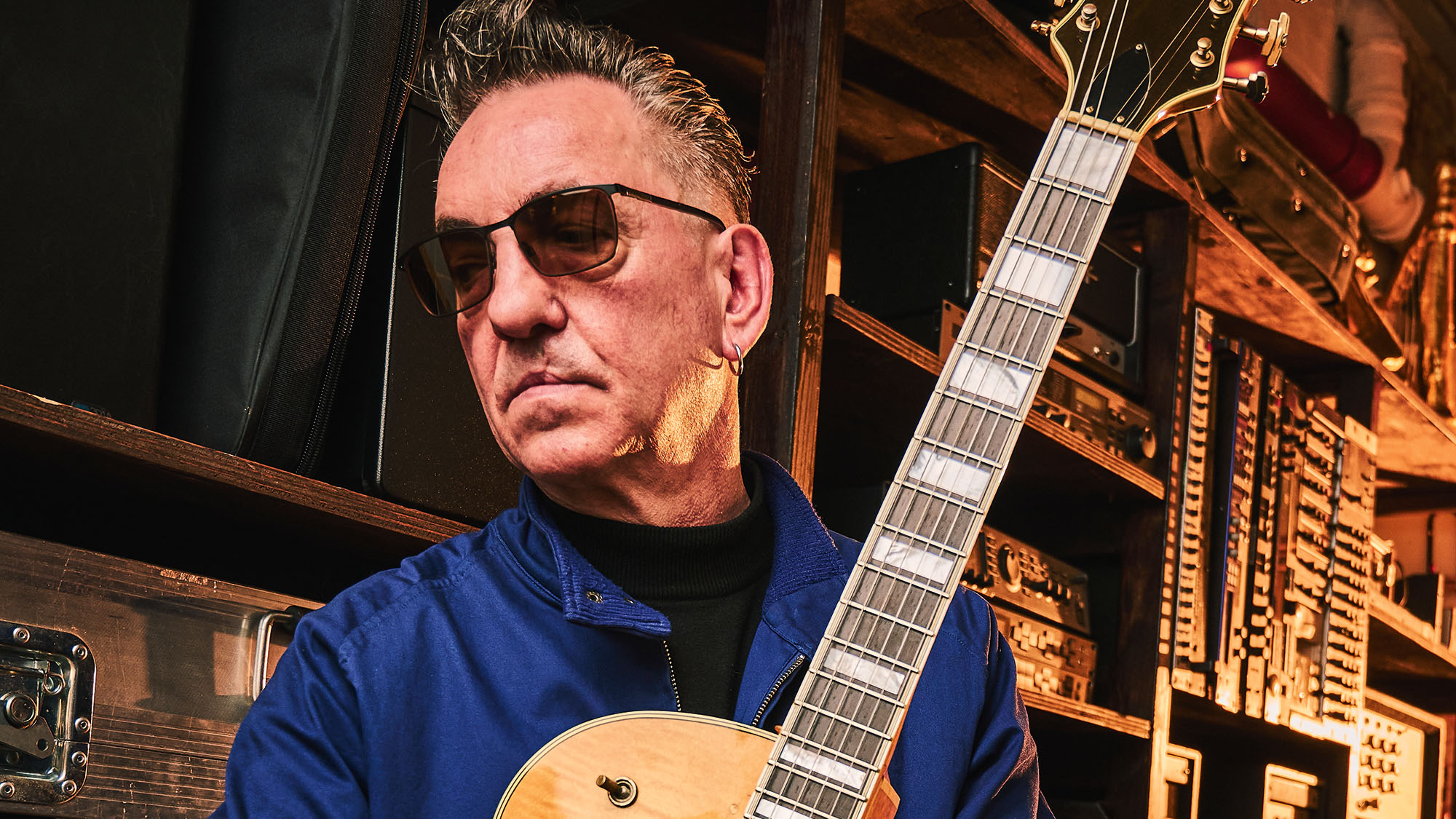“Robert Plant said, ‘We’re going to do Rock And Roll by Led Zeppelin.’ I said, ‘I’m not doing it – I don’t want to be in Jimmy Page’s graveyard!’” UK songwriting icon Richard Hawley talks big name jams, guitar shopping – and restoring Scott Walker's Tele
Hawley doesn't hide his influences but instead synthesizes them into a sound that is all his own. And on new album, In This City They Call You Love, he might just have ascended into the ranks of the legends

Reverent references to Duane Eddy, Pops Staples, Scott Walker and other giants of the vinyl era are never far from Richard Hawley’s lips. But with his new album, In This City They Call You Love, Hawley has produced a work that deserves to stand alongside that of the legends he has always admired.
You’d never hear him say that himself, of course, as there’s a genuine and abiding humility in his approach to music. But the tender, yearning ballad I’ll Never Get Over You is a song that Roy Orbison might easily have penned, while Hear That Lonesome Whistle Blow sounds like a lost, lovelorn Eddie Cochrane ballad.
Yet Hawley somehow manages to wear his influences lightly, like a well-fitting jacket that suits him and that he makes his own. And if the past looms large in his work, its main purpose is to highlight the unbroken threads of memory, pride and love that stretch from childhood to the present day and imbue it with meaning.
A particularly enduring theme in Hawley’s music is his home city of Sheffield – he’s named several of his albums after its landmarks, and the place and its people are a continuing wellspring of inspiration. Ironically, however, it was a chance encounter with visitors from out of town that gave his latest album its name.
“It was something I overheard some people saying,” Hawley recalls. “They weren’t from Sheffield and one of them said, ‘Oh, in this city everybody calls you love,’ and it went in like a missile. I just heard that, literally walking past a cafe and I went, ‘Whoa, I’m having that.’ You know?”
Hawley acknowledges that songwriters have to have something of the magpie about them, always ready to snatch up a golden phrase and wing home with it, to be tucked away for later use.
He adds that the best songs come from that part of our mind that isn’t caught up in mundane, day-to-day decision-making. Words and phrases overheard by chance can open the taps to a sudden, instinctive flow of inspiration that yields better songs than conscious effort, he argues.
Get The Pick Newsletter
All the latest guitar news, interviews, lessons, reviews, deals and more, direct to your inbox!
I write all the songs walking the dogs now because there’s something about putting one foot in front of the other, where something flips in your mind
“You can hit the bullseye without aiming for it. But if you aim for the bullseye, you’re probably not going to hit it. Technically, music is numbers and letters, mathematics and literacy. But actually it’s something that you cannot define. You can’t bottle it. You know what I mean?
“I write all the songs walking the dogs now because there’s something about putting one foot in front of the other, where something flips in your mind… with rational, normal thought, that you need to survive on Earth, your yes/no synapses are flipping all the time in your mind.
“But there’s something that happens when you’re doing something rudimentary, like walking the dogs, washing the pots or whatever… you hit the bullseye without aiming for it. And that’s the best advice I can give anybody who’s going to write a song. If you try to write a song, it’ll probably be shit.”
We can only conclude that Richard’s dogs must have had plenty of exercise recently because every song on the album hits home emotionally. The production is simple yet beautiful, a touch less orchestral than some of his previous records perhaps but all the more direct and powerful for it.
A key theme is memory and how we live with it – of loves and loyalties that fade all too quickly into the past, yet from which we can never wholly free ourselves.
“I think music gives you the ability to accept the fact that maybe we are mortal, but also to hover like a kestrel in time,” Richard reflects. “You’ve got more time than you realise, to think about things.”
The songs on the album are often deceptive in their simplicity. Deep Water, for example, is a kind of secular gospel song – a prayer for acceptance of the kind that people tend to write as life experience accrues and an awareness of mortality colours one’s thoughts.
“The thing about records, I realise as I’ve got older, is that I listened to stuff when I was younger and I just thought, ‘That’s rubbish,’ and then later in life, I got it,” Richard reflects.
“And it’s because you’re not ready for it, as a person. Events and time and ageing and stuff like that… you’re not swimming in the fucking shallow end any more. You haven’t got a choice.
“So music is an accompaniment to the passage of your life, and some songs you’ll hear when you’re 16 you’re not ready for, but you might hear them when you’re 40 or 60, or whatever, and you get it.
“A lot of folks, you know, when they hit 30, they think it’s over, you know? But when you approach 60 and you see a picture of yourself at 30, you just go, ‘Didn’t I look young?’ [laughs] Do you know what I mean?
“Nick Banks, actually, one of my dearest friends, the drummer out of Pulp, he sent a picture of me and him backstage at Finsbury Park in ’98, and we were in our 30s then, and I look back and I just go, ‘Whoa, man, we look like little kids.’ And we were off our heads as well. I just thought, ‘Stupid, stupid boy.’ [laughs]”
Guitar Man
Fittingly, Hawley’s guitars are as steeped in time and memory as his songs, especially his gorgeous 1950 Gibson J-200 bought from Tony Werneke at Replay Guitars, which has a sweet yet expansive voice that is what that guitar is all about, at its best.
“Martin Simpson found this for me,” Hawley explains, referring to the celebrated fingerstyle folk guitarist who is a good friend of Richard’s. “Because my dad had a J-200. And it was a ’60s one – I think it was a ’62, or something like that. And during the steel strikes he had to sell it, to feed us, you know?
My dad had a J-200. And it was a 60s one – I think it was a ’62, or something like that. And during the steel strikes he had to sell it, to feed us
“There was always this thing in my mind [ever afterwards] that it was an injustice. And so I looked around for one for years and years and years. It’s funny – because it’s part of mine and Martin’s story – he just says ‘Oh, you don’t want one of those, you want one of these’ – a PRS or a Fylde or one of these really mental high-end guitars.
“But I couldn’t get on with them at all… maybe it’s an ergonomic thing, but they just didn’t feel right. I think it’s down to sonic memory. Because when you play something when you’re young there’s a part of your brain that works in a certain way…”
Richard strums the first few bars of Hear That Lonesome Whistle Blow to demonstrate, then grins at the wonderfully evocative sound coming out of the J-200.
“And that’s it,” he smiles. “It’s a great guitar to play and the neck’s not as slim as a lot of the modern ones. But it’s to do with ergonomics, isn’t it? It’s bit like if you go into a shop and you want to buy a new shirt or a jacket or something like that, don’t look in the mirror – put it on and see how it feels first, you know? And it’s the same with any musical instrument.
“Close your eyes and just listen – you were given these [points to ears] by nature for a reason and you can read all the reviews you want, you can you can be fooled into buying something because you think it’s going to be this, that and the other. But you’ve got to use these, your ears – they’re the greatest asset you’ve got.”
Does Richard use the J-200 a lot when he’s recording, we enquire?
“I use it when I’m frying eggs,” he laughs. “Or whatever… It’s on the wall [ready to hand at all times]. It’s just such a great guitar to play.”
No Richard Hawley record would be complete, of course, without the lonesome shimmer of a Gretsch electric. Accordingly, Richard shows us a beautifully figured natural finish 1954 Gretsch Country Club that is a go-to for studio work.
“I love that – it sounds like Pop Staples to me,” he says, strumming the big archtop through the beautiful tremolo circuit of his 1958 Watkins Scout combo.

“That’s one of the problems with the Gretsches, but I’ve always found it an asset,” he observes as the guitar teeters on the edge of incipient feedback. Like some other vintage guitars among Hawley’s collection, the Gretsch was bought locally.
“I got this from a local store in Sheffield called Rich Tone Music and it’s run by people who subsequently became friends of mine – James and Dylan Ferguson – and they’ve always got amazing stuff.
“Again, actually I owe Martin Simpson again for this because he’s in and out of there all the time and I’m always on tour or travelling and stuff, and he’ll just [tell me] they’ve got this such and such guitar…
“He called me up and said, ‘They’ve got this Country Club and it’s insane – it’s a 1954, you’re going to love it.’ I went down with him and I literally just played a couple of chords on it and I’m done. In my mind I was sold.
“I ended up using it on the Jools Holland show [only days later] and I got asked to play with Robert Plant and Imelda May. It was the last song of the show at the Hammersmith Apollo, when they did it there, and it’s quite fun because it wasn’t anything that we’d rehearsed.
“I was playing with Jools doing Fats Domino stuff and we’d had this idea to play an A- and B-side from the same single, back to back, so we did those two tunes and Robert heard me play. I’ve known Robert on and off for many years, he’s a lovely fella, and so afterwards he just called me over to the piano and said, ‘Do you want to do a song with us?’ It was nothing to do with management and completely unscripted.

“So I said, ‘Yeah, what is it?’ and Robert said, ‘We’re going to do rock ’n’ roll.’ I said, ‘Yeah, what song?’ And he said, ‘Rock ’n’ roll…’ and I go, ‘Yeah, yeah, I can play rock ’n’ roll, but which song? And he says, ‘No, you silly fuckwit [laughs], Rock And Roll by Led Zeppelin.’ I said, ‘No, I’m not doing it because I don’t want to be in Jimmy Page’s graveyard,’ you know – nobody can play like Jimmy, he’s the don of that [style of guitar].
“And he said, ‘No, we’re going to do it like Johnny Burnette and the Rock ’N’ Roll Trio. So I said, ‘Okay,’ and we did it like that – and that was the first time I ever used the Country Club. I’d only bought it a week or so before and I had it plugged into an old 50s Magnetone amp, which has got this really… it’s not a tremolo, it’s a vibrato, which is actually different and it sounds like liquid. Bo Diddley used one, and Eddie Cochran – it’s got this liquid sound to it, like moving water. It’s amazing.”
Great Scott
One testament to the bond music can create is the fact that many of Hawley’s heroes later became personal friends – notably the late, great Duane Eddy, with whom Hawley recorded the beautiful album Road Trip in 2011.
Hawley also became friends with one of the most interesting figures in 20th century pop, Scott Walker, who after huge initial success as a mainstream ’60s orchestral pop star developed into one of the most nuanced, innovative and experimental artists working in contemporary music.
Walker and Hawley met while working on Pulp’s 2001 album, We Love Life, which Walker produced, and their friendship blossomed after a rocky start when Hawley turned up late to a session with the fastidiously punctual Walker. Hawley’s reason for being late – rescuing a stack of rare records from a closing-down sale – earned
Walker’s forgiveness, however, and their friendship grew from that moment forward. Though Walker passed away in 2019, his white circa mid-70s Telecaster features prominently on Richard’s latest album, as Hawley explains.
“Three days into recording the new record, I got a phone call from my old friend Cathy [Negus-Fancey], who was Scott Walker’s manager,” Richard explains. “Scott and I were friends, we used to play darts and sup Guinness together and there was no discussion of music – it was just darts and Guinness and occasionally a game of pool, but he was shite at pool so I’d always hammer him.
“So he preferred darts because I was crap at darts – I still am [laughs]. Anyway, Lee, his daughter, said one of last requests was to [feigns a parody of Scott Walker’s drawl] ‘Give that tosser Hawley one of my guitars…’ and this is it.
“It arrived three days into recording the new record and I must say it was in quite a parlous state. It had been unplayed and my long-suffering guitar tech, Gordon White, who is a genius, [took on the job of fixing it up] and the hardest decision was to actually do anything with it at all.
“Because basically, [traces of] Scott blood’s was on there – his physical remnants were on the guitar. But Gordon said, ‘Fuck it, it’s got to be playable,’ and he fixed it all and made a beautiful thing and it was very, very close to me recording the new record; I recorded all the mad shit on it.”
Hawley says Walker’s impeccable musicality and rigorous high standards made him such a formidable artist and producer.
We did this track on We Love Life called Bob Lind (The Only Way Is Down) where I had to play acoustic 12-string guitar... my fingers at the end of that session literally bled
“We did this track on We Love Life called Bob Lind (The Only Way Is Down) where I had to play acoustic 12-string guitar. Jesus, he [Scott] whipped me like a racehorse, I’m telling you. He made me do it again and again. He was saying, ‘Bite in, bite in – play deeper, like really dig in…’ And my fingers at the end of that session literally bled. But the end results were great.
“I learned a lot from Scott, especially about microphones. His ears were immense: he could hear subtle inflections in the sonic quality of microphones or guitars or whatever it was, and his sonic palette was so expansive… I mean, I’m not really a musician. I just collect sound, you know, that’s what I do. And I think Scott got that… but he was still shit at pool [laughs].”
- In This City They Call You Love is out now via BMG.
Jamie Dickson is Editor-in-Chief of Guitarist magazine, Britain's best-selling and longest-running monthly for guitar players. He started his career at the Daily Telegraph in London, where his first assignment was interviewing blue-eyed soul legend Robert Palmer, going on to become a full-time author on music, writing for benchmark references such as 1001 Albums You Must Hear Before You Die and Dorling Kindersley's How To Play Guitar Step By Step. He joined Guitarist in 2011 and since then it has been his privilege to interview everyone from B.B. King to St. Vincent for Guitarist's readers, while sharing insights into scores of historic guitars, from Rory Gallagher's '61 Strat to the first Martin D-28 ever made.
Ozzy Osbourne’s solo band has long been a proving ground for metal’s most outstanding players. From Randy Rhoads to Zakk Wylde, via Brad Gillis and Gus G, here are all the players – and nearly players – in the Osbourne saga
“I could be blazing on Instagram, and there'll still be comments like, ‘You'll never be Richie’”: The recent Bon Jovi documentary helped guitarist Phil X win over even more of the band's fans – but he still deals with some naysayers




















